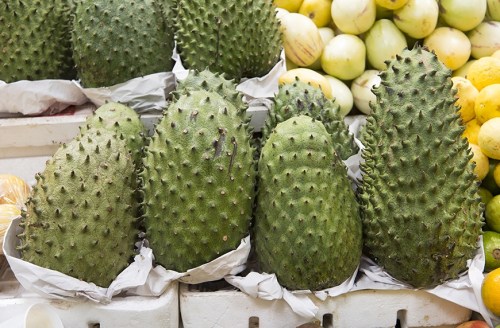If you’ve never heard of a funny sounding fruit called soursop, join the club. But given all its good-for-you benefits, it’s time to get familiar. The green, heart-shaped fruit of the Graviola (or annona muricata) tree can weigh up to 15 pounds and grows in tropical regions of North and South America. Besides tasting great (its extract is often consumed as a dessert in Guyana, Brazil, Haiti), soursop has a pretty stellar nutrition profile, too.
“Soursop contains more than 200 chemical compounds in its pulp, leaves, and stems that contribute to its many health benefits,” explains nutritionist Tamar Samuels. “[It’s] particularly rich in alkaloids, phenols, and acetogenins.” The average soursop fruit is 66 calories and includes 1 gram of protein, 16.8 grams of carbohydrates, 3.3 grams of fiber, and is full of vitamins and minerals like magnesium, vitamin C, potassium, thiamine (or vitamin B1), and more. In the U.S., it’s available at most grocery stores—and you’re likely to find it in markets that have a wide variety of fruits and vegetables, like Whole Foods.
So, what are some of the main benefits of all these chemical compounds found in soursop, and why should you consider incorporating this buzzy ingredient into your diet? Let’s take a closer look.
1. Soursop is anti-inflammatory
Looking for a new way to fight inflammation? Soursop can help with that. “[It’s] been found to decrease the expression of several inflammatory compounds, including tumor necrosis factor-alpha and interleukin-1beta protein expression,” says Samuels. That’s an inflammatory protein known as a cytokine that communicates information between cells, FYI. Soursop gets is anti-inflammatory goodness from the alkaloids, phenols, and acetogenins it contains.
2. Soursop improves the immune system
Soursop isn’t just a great way to help protect yourself against the common cold: It could also protect against parasites and viruses. “The flavonoids, steroids, and alkaloids found in soursop extract have been found to be effective against various types of bacteria, parasites, and viruses, including herpes simplex virus-1,” says Samuels.
3. Soursop may have anti-cancer properties
While scientists need to conduct more research before making any serious claims, there’s some evidence to suggest that soursop may help fight cancer. “A recent systematic review found that soursop leaf extract exhibited anti-cancer effects against many cancer cell lines, and in animal studies, soursop extract decreased tumor size in various types of cancer,” says Samuels. “The acetogenins found in soursop have been found to inhibit cancer cell growth, decrease glucose and ATP availability to cancer cells, induce apoptosis, and support antioxidant production.”
The possible risks of soursop
Like most things, soursop does have its risks, especially when consumed in large doses. The seeds, in particular, can be a bit dangerous. “Some research has found that consumption of large amounts of soursop seeds and/or tea made from its leaves and stems may cause neurotoxicity and movement disorders similar to Parkinson’s disease, and it may exacerbate Parkinson’s symptoms,” Samuels says. “Soursop is also not safe to use during pregnancy.”
How should you use soursop?
There are a lot of ways to consume soursop, although as a reminder it’s best to avoid the seeds, as they can be toxic. Other than that, eat the flesh of the fruit raw or juiced—being mindful of the fact that soursop is best enjoyed when eaten ripe or soft.
“Soursop tastes sweet with a hint of sourness, similar to pineapple,” says Samuels. “In countries where it’s grown indigenously, it’s often incorporated into desserts and even used in soups or roasted like vegetables. Medicinally, soursop leaves are dried and brewed to make guanabana tea or used in extracts.”
Smoothies are another way to enjoy the health benefits of soursop, or even baked into cheesecakes. The possibilities are endless.
Now that you’re schooled on the many benefits of soursop, why not experiment with incorporating it into your meals? You may just find it’s your new favorite staple.
If you’re looking for more inflammation-fighting foods, here’s how to make a balanced, anti-inflammatory meal—plus, five food swaps to make in your pantry.
Sign Up for Our Daily Newsletter
Get all the latest in wellness, trends, food, fitness, beauty, and more delivered right to your inbox.
Got it, you've been added to our email list.











